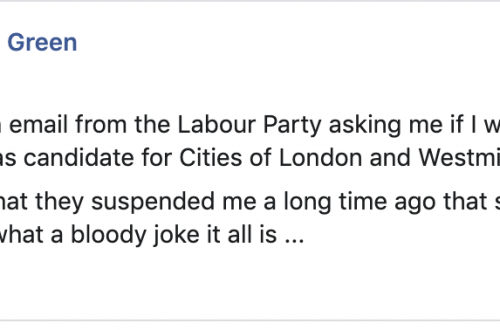As has been widely reported, the Home Affairs Select Committee has raised a range of concerns relating to antisemitism in the UK. Targets include Malia Bouattia, the Chakrabarti report, and Jeremy Corbyn’s weak leadership on this issue. However the Labour Party was not the sole focus of criticism, and the report noted that ‘Labour voters were no more likely than voters from other parties to express antisemitic attitudes, with UKIP voters demonstrating the highest levels of antisemitism’.
The key points have been widely discussed, so I’ll pick out just one striking paragraph.
Mr Corbyn was specifically challenged about the views of his Executive Director of Strategy and Communications, Seumas Milne, who had been filmed at a demonstration in 2009, at which he said that Hamas “will not be broken” due to the “spirit of resistance of the Palestinian people”. The Covenant of Hamas states that “Israel will exist and will continue to exist until Islam will obliterate it” and that “There is no solution for the Palestinian problem except by Jihad.” Mr Corbyn told the Committee that he did not think it “appropriate” for him to be asked questions about the views of “every single member of staff “ he employs, and said that he had not seen the video concerned, but described Mr Milne as a man of “immense intellect” and a “scholar”.
and juxtapose it with this comment on his leadership:
Clearly, the Labour Leader is not directly responsible for abuse committed in his name, but we believe that his lack of consistent leadership on this issue, and his reluctance to separate antisemitism from other forms of racism, has created what some have referred to as a ‘safe space’ for those with vile attitudes towards Jewish people.
I particularly like that cooption of the term ‘safe space’.
There was much to welcome in this robust report. It criticised Baroness Chakrabarti’s failure to engage wholeheartedly with how antisemitism might be defined, and included some useful and sustained reflections on this issue. However it perhaps needed to be still more precise and explicit about the relationship between anti-Zionism and antisemitism – or simply articulated more clearly what a complex and contested area this is.
It was clear and useful on the particular problems surrounding the terms ‘Zionist’. For example here it describes how Zionism is used as a a way of signifying something nebulous but sinister rather than a certain view (or spectrum of views) about Israel:
The report of the 2006 All Party Parliamentary Inquiry into Antisemitism argues that “criticism of Zionism is not in itself antisemitic”, but that an “antisemitic discourse” has developed in some quarters that “views Zionism itself as a global force of unlimited power and malevolence throughout history”.
Different views of the relationship between Zionism and antisemitism were presented.
In an article for The Daily Telegraph in May, the Chief Rabbi criticised attempts by Labour members and activists to separate Zionism from Judaism as a faith, arguing that their claims are “fictional”. In evidence to us, he stressed that “Zionism has been an integral part of Judaism from the dawn of our faith”.
The report of the 2006 All Party Parliamentary Inquiry into Antisemitism argues that “criticism of Zionism is not in itself antisemitic”
The report recommends the adoption of a slightly modified form of the IHRA definition of antisemitism (which is itself based on the EUMC working definition). This includes the clause:
—Denying the Jewish people their right to self-determination, e.g., by claiming that the existence of a State of Israel is a racist endeavour.
However the report also states that
‘Zionism’ as a concept remains a valid topic for academic and political debate, both within and outside Israel.
I wondered if these two statements were fully compatible.


